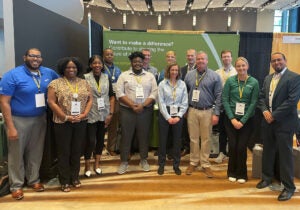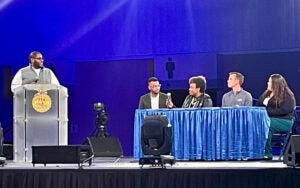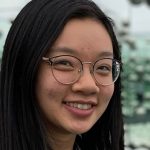By fostering a welcoming and inclusive environment, Syngenta is setting an example for who can be in the agricultural sector. The company has long been a leader in agricultural products, but it hopes to also lead the way for diversifying a historically White, male-dominated profession.
Brandon Bell, newly promoted to the position of People and Organizational Development Lead for US Crop Protection, has been working at Syngenta since 2020 to spearhead this mission. An African-American in his mid-30s, Bell has spent the past five years developing diversity, equity, and inclusion initiatives.
Originally the Diversity and Inclusion Lead for Syngenta North America, Bell has led various DEI initiatives at the company. Under his promotion, Bell will further expand on these initiatives while developing new programs that enhance both customer experience and employee engagement.

After attending University of North Carolina at Wilmington, Bell did not plan on an agricultural position. He started his career as a crisis counselor, where he helped clients get through some of the toughest moments in their lives.
As a sociology major, Bell was interested in how social structures create not just safe spaces, but also atmospheres of exclusion. He wanted to learn about how to build community and found that diversity, equity, and inclusion (DEI) practices were a way to connect with others.
“Despite the diversity in my clients, the core set of things they needed was the same,” Bell said.
Taking this mindset with him throughout his career, Bell has really emphasized these core needs within DEI programs he has led, including as former director for DEI at Elon University. When the opportunity to help develop DEI initiatives at Syngenta arose in 2020, Bell said he felt that this was an excellent opportunity to apply his skills while generating positive impact.
“Ultimately, my goal is to bring more people to the table; after all, everyone has the shared need to ‘eat’,” Bell said. “By bringing in diversity, the differences enhance our overall ability to create a safe community.”
As the descendant of a sharecropper and with his father working at the U.S. Department of Agriculture, Bell said that this opportunity was a particularly unique role which he was qualified to fill. Bell recalls helping his grandmother farm the two acres her family owned when he was a child, but despite being “ag-adjacent” as he called it, things didn’t click for him until his offer with Syngenta emerged.
By merging his background/family history in agriculture with his formal education in sociology and applied work experience, Bell is positioned to help those in the agricultural sector in novel ways.
One initiative that Bell is focusing on with Syngenta is changing the narrative about who belongs in agriculture.
By leaning on external partners, Bell is promoting a positive relationship dynamic between Syngenta and other groups, such as Minorities in Agriculture, Natural Resources, and Related Sciences (MANNRS), the National FFA Organization, Women in Ag, and the National Black Growers Council.
Partnering with such a diverse array of organizations and groups helps broaden the creativity and innovation that agriculture needs today.
In addition to broadening the diversity of who is in agriculture, Bell also hopes to promote diversity about what being in agriculture means.
“There are so many ways to be in agriculture without being in production,” says Bell. “And there’s such a stigma around production agriculture, especially for minority communities.”
Bell hopes to rectify this through his work with Syngenta. He himself as an African-American sociologist is an example of how someone can be in the agriculture industry and make a positive impact without being in production.
“I knew the power of ag, the value of ag, but never saw myself in agriculture until [my offer with Syngenta] … I never knew the expanse of agriculture — [looking back], I didn’t know you could be an ag communicator, or that there was such a thing as a rural sociologist,” said Bell.

Whether through communications, social work, or other skills, Bell hopes to help each individual see their unique contribution to agriculture.
Each day at Syngenta looks different for Bell. He strives to center his job duties around the needs of his clients, whether they are fellow employees or growers.
“Each day [at Syngenta] runs the gambit,” said Bell. “I can be having an outreach call with a journalist, consulting with leaders in other countries on their own DEI initiatives, or getting a call from an employee about issues they need help with.”
No matter his task, Bell hopes to foster a sense of community where people feel heard and seen, critical in a sector where inclusion will be key to the future of agriculture.
When asked about how Bell translates his prior experience working one-on-one with individuals to leading an entire DEI initiative at a company as large as Syngenta, Bell heavily emphasized thinking about the client and keeping their needs centered.
“Even at the systematic level, change is often made in the one-on-one interactions,” Bell said. “How you go about finding solutions and supporting [people] are more similar [than you think]…but you have to be very methodical. I feel incredibly empowered to be able to help people at such a scale.”
By continuing to keep the end user in mind, Bell is leading the way for Syngenta to be a leader and enabler for DEI in agriculture. Bell wants Syngenta to be seen as and truly be a champion for diversity in agriculture, and hopes to expand the company’s partners to include veterans in agriculture as well as promoting those with disabilities to join the agricultural sector.
He touts the uniqueness of agriculture as an industry that touches upon so many different aspects of life and says he is excited to be at the helm of an initiative that can drive diversity and inclusion.
“There are so many ways that people can be connected to agriculture — I’m going to help you find your place,” Bell said.
Liza Thuy Nguyen serves as the 2023 American Farmland Trust Agriculture Communications Intern at AGDAILY, with a focus on helping to amplify diversity and minority voices in agriculture. Liza is originally from Anaheim, California, and attended the University of California, Davis, as a first-generation college student. She received a bachelor’s degree in genetics and genomics and went on to earn a master’s in horticulture from Penn State.





